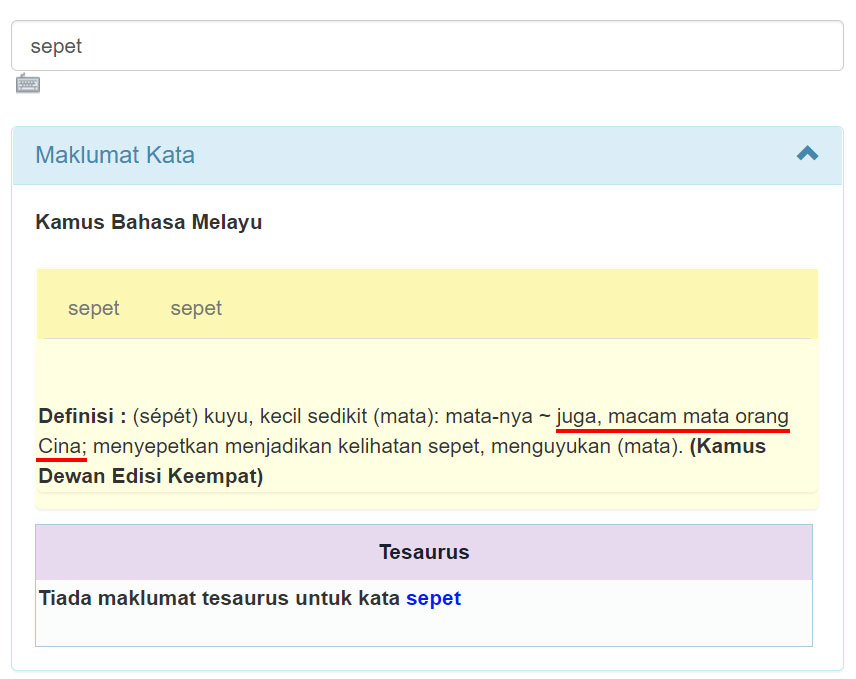DBP Promises To Remove 'K-ling' Slur From 'Tambi' Definition Following Criticism
Dewan Bahasa dan Pustaka (DBP) is in hot water after several politicians accused the Malay language body of insulting the Indian community in Malaysia.
Subscribe to our Telegram channel for our latest stories and breaking news.
Editor's Note: The story has been updated to correct a change in the definition.
Dewan Bahasa dan Pustaka (DBP) has responded to the criticism against it for using a derogatory word towards Indians in one of its dictionaries.
However, in the three-page statement, the language body failed to apologise for using the word.
The controversy arose when MIC Youth member Thiagaseelan Ganesan, MIC Senator S Vell Paari, and Penang Deputy Chief Minister P Ramasamy, among others, criticised the government body responsible for coordinating the use of the Malay language in the country for using the word 'k-ling' in its dictionary.
DBP used the word while defining a Tamil word 'tambi', writing, "panggilan utk orang k-ling yg lebih muda drpd kita" (a term used to refer to a k-ling person younger than ourselves).
According to Malaysiakini, although some older people and people in the northern region of Peninsular Malaysia use the word to refer to Indians, it is generally considered derogatory in this day and age.
Thiagaseelan, Vell, and Ramasamy decried the language body, demanding an explanation for using the word, while the latter also demanded DBP issue a public apology.
Vell claimed that the inclusion of the derogatory word in the dictionary is a deliberate move to insult Indians in the country.
"This is the sad state of the country where they can officially insult us. I hope the National Unity Minister immediately checks on this," said the MIC Senator.
"And please don't say it is a mistake and brush it off. Investigate who did it. If it is recent, the person responsible should be sacked."
In response to the controversy, DBP said the word is only used in the Kamus Pelajar, while the Kamus Dewan and the Kamus Dewan Perdana have removed the word
The Malay language body said that the fourth edition of Kamus Dewan (2005) defined 'tambi' as "a term used to call an Indian who is a younger brother", while Kamus Dewan Perdana (2020) defined it as "a term used to call a young Indian man who is a younger brother".
"Regarding the use of the word 'k-ling' while defining 'tambi' in Kamus Pelajar, this dictionary was published in 1987 and only new entries were included when it was updated in 2007," DBP said in a statement published yesterday, 22 March.
"However, DBP is planning to update and compile the third edition of the dictionary, and aspects of definition improvement will be given attention in this new edition."
Prior to the public uproar, its online dictionary uses the definition from the second edition of Kamus Pelajar on the word 'tambi', and DBP executive director Abang Sallehuddin Abg Shokeran told Malaysiakini that the definition would be replaced with a definition from a more recent publication.
A check by SAYS earlier today found that the definition for 'tambi' read, "panggilan utk orang India yg lebih muda drpd kita." However, it now seems that the definition has reverted to using 'k-ling'.
While searching another derogatory word on the online dictionary, the definition for the word 'sepet' reads, "Dull, slightly small eyes" with an example sentence that says, "Like the eyes of Chinese people".
In its statement, DBP defended itself by saying its publications have historical elements and are "living dictionaries"
"All the facts about the words ever used in the community of Malay speakers will be recorded in the dictionaries," it explained.
"The same is the case with the word 'k-ling' that existed in the Kamus Dewan since its first edition, which was published in 1970."
"However, in the process of the coming up with its definition, there are changes and improvements undertaken by the compilers of Kamus Dewan on the 'k-ling' word in accordance with the historical elements and sociolinguistic factors of the word."
"For example, from the meaning recorded by Kamus Dewan in 1989 and 1994 editions, they explicitly mentioned and educated the public that 'k-ling' should not be used, and it is better to use the word 'Indian', which is used to refer to an Indian."
DBP said 'k-ling' now is now marked as a taboo word along with other words such as 'anjing', 'hamput', and 's-kai'.
The Malay language body also mentioned that in 2003, a challenge was brought against DBP to remove the word 'k-ling' from the Kamus Dewan, but the Kuala Lumpur High Court ruled that DBP could continue using the word as there was no mala fide.
The statement ended without apologising for the use of the derogatory word nor mentioning which party in the body was responsible for the oversight. It disregarded the politicians' demands.

